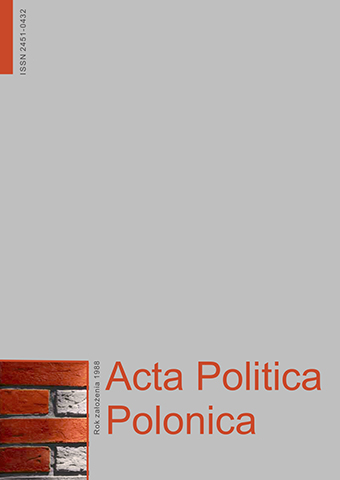
ISSN: 0867-0617
OAI





Issue archive /
1/2010 (23)
Czy władza ekspercka jest władzą?
(Is expert power a power?)
| Authors: |
Jerzy
Pawliszcze
Akademia Humanistyczno-Ekonomiczna w Łodzi |
| Keywords: | power, political expert, political values, political philosophy |
| Data publikacji całości: | 2010 |
| Page range: | 20 (105-124) |
Abstract
The aim of the article presented below is to discuss one of main topics of contemporary political philosophy, i.e. the status of expert power. Origins of this problemare connected with Plato’s Republic and Laws: especially I think about the role of king-philosopher and „Nocturnal Court” from Laws. But, in modern times the intellectualand political role of experts is not to overestimate and consequently we have many theories of “power from authority” (Wrong, Wartenberg). In this short study the thesisis has been given about: power of experts is strictly not a power but only “resource” of power and is in relationship to it as neoscholastic potency to actus. It has beenproved with testimonia from Aristotelian Metaphysics and dramaturgical sections of Poetics.
Bibliography
| 1. | Bachrach P., Baratz M.S., The Two Faces of Power, "American Political Science Review" 1962, t.56. |
| 2. | Bachrach P., Baratz M.S,. Decisions and Nondecisions: An Analytical Framework, "American Political Science Review" 1963, t. 57. |
| 3. | Bachrach P., Baratz M.S., Power and Poverty: Theory and Practice, New York: Oxford University Press, 1970. |
| 4. | Machiavelli N., Discorsi sopra la prima deca di Tito Livio, Biblioteca Universale Rizzoli, Milano 1996. |
| 5. | Chantraine P., Dictionnaire étymologique de la langue grecque. Histoire des mots, Éditions Klincksieck, Paris 1983. |
| 6. | Clegg S.R., Frameworks of power, Sage Publications, London, Thousand Oaks, New Delhi 2002. |
| 7. | Dahl R.A., The concept of power, "Behavioral Science" nr 2. |
| 8. | Dahl R.A., Modern Political Analysis, Englewood Cliffs, N.J.:Prentice Hall 1963. |
| 9. | Foucault M., Discipline and Punish: The Birth of the Prison, Harmondsworth: Penguin 1977. |
| 10. | Foucault M., The History of Sexuality, vol. 1: An Introduction, przekład. R. Hurley, New York: Pantheon, 1978. |
| 11. | Foucault M., Power/Knowledge: Selected Interviews and Other Writings, 1972-1977, red. Colin Gordon, New York: Pantheon, 1980. |
| 12. | Giddens A., Central Problems in Social Theory: Action, Structure, and Contradiction in Social Analysis, London: Macmillan 1979. |
| 13. | Giddens A., The Constitution of Society, Cambridge: Polity Press 1984. |
| 14. | Goffman E., Encounters, Indianapolis: Bobbs – Merrill 1961. |
| 15. | Hobbes Th., Lewiatan, czyli materia, forma i władza państwa kościelnego i świeckiego, przeł. C.Znamierowski, PWN, Warszawa, 1954. |
| 16. | Hobbes Th., Leviathan, Indianapolis: Bobbs- Merrill, 1958. |
| 17. | Krąpiec M.A., Człowiek i prawo naturalne, TN KUL Lublin 1975. |
| 18. | Lukes S., Power: A Radical View. The Original Text with Two Major New Chapters, Palgrave Macmillan 2005. |
| 19. | Nisbet R.A., The Sociological Tradition, New York: Basic Books 1966. |
| 20. | Parsons T., The Structure of Social Action, New York: McGraw-Hill, 1937. |
| 21. | Peters F.E., Greek philosophical terms. A historical lexicon, New York, New York University Press; London, University of London Press Limited 1967. |
| 22. | Riklin A., Die Fűhrungslehre von Niccolò Machiavelli, Wien 1996. |
| 23. | Russell B., Power: A New Social Analysis, London: George Allen and Unwin 1938. |
| 24. | Shils E.A., Charisma, Order and Status, "American Sociological Review" 1965, t. 30. |
| 25. | Weber M., Gospodarka i społeczeństwo. Zarys socjologii rozumiejącej, Przeł. i wstępem opatrzyła D. Lachowska, Warszawa, PWN 2002. |
| 26. | Wartenberg T. E., The Forms of Power. From Domination to Transformation, Philadelphia: Temple University Press, 1990. |
| 27. | Wrong, D.H., Power: Its Forms, Bases, and Uses. With a New Introduction, Chicago, University Press, Transaction Publishers 1979. |